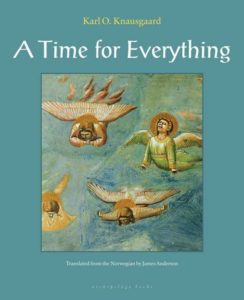 A Time for Everything, by Karl Ove Knausgaard, translated by James Anderson IndieBound | amazon
A Time for Everything, by Karl Ove Knausgaard, translated by James Anderson IndieBound | amazon
My writeup of Karl Ove Knausgaard’s Seasons quartet is posted on The Millions. In it, I mentioned Knausgaard’s earlier novel, A Time for Everything, as “mind-boggling.” Here are some thoughts on it.
The humans who tangle with angels in A Time for Everything do not fare well. In this nested story, innermost is a historical account of angels. Wrapped around this is the life of Antinous Bellori, a late 16th / early 17th century man whose study of angels begins and ends with spiritually and emotionally devastating encounters with angels. Framing Bellori and the angels is an unnamed narrator. (And then Knausgaard himself.)
The narrator’s imaginings of different points of view, the filters and reveals, drive the book more than traditional plot or character. The prose is textured, rich, and vivid, except when it bogs down, now and then, with syntax so overwrought, just making sense of it saps any energy that might be applied to immersing oneself in its meaning.
The angelic history that forms a chronological line in the book follows tracks laid down by Bible stories, folklore, accounts of angelic visitations, and portrayals of angels in artworks. The narrator’s Bible story adaptations verge on kooky, as does the narrator himself. His thought pieces* knit Bellori’s life and the fate of the angels into an existentialist, psychological commentary that tries to point outward, to Bellori and angels, but keeps swerving back inward, to the narrator.
We never find out who this narrator is in the ordinary sense of a name, a job, a position in life, except for a few broad strokes. Until the end, we don’t even know where he (you know it’s a man, somehow) physically is, though clearly it’s a solitary place conducive to thinking and writing and being lonely: a melancholic study of some kind. It’s far from clear what his aim is, beyond roping in his readers, whom he often addresses directly, but we quickly come to see that he’s articulate, clear-thinking, perhaps manic, certainly driven; and that obsessiveness and depression or despair eat through his words and render his account, which he presents as nonfiction, unreliable, deceptive: fictional. If you’ve read My Struggle, you’ll see elements of Knausgaard himself in this narrator, though you wouldn’t want to make the mistake of taking the resemblance too far.
The mixed structure and the precarious sanity of the main characters — Belloris and the narrator — evoke Herman Melville’s Moby Dick. There’s good and evil, monsters (angels), obsession, pursuit, tar-black depression, mutilation. The narrator naturally would seem to take the role of Ishmael. He’s in charge of the story and like Ishmael, he addresses the reader directly. Unlike Ishmael, though, whose relationship to his readers is confiding and confident, Knausgaard’s narrator is at times confrontational, at times wheedling, working hard to persuade: a distressed soul who’s found in you the only person willing to listen to him — Hey, wait, I’m not finished yet! And you do wait, because he always comes up with something to pull you back in.
Also in contrast to Ishmael, who makes it clear he does not identify with Ahab, the narrator of A Time for Everything lacks separation from Bellori, master of the hunt. It’s more as if he considers himself to be a continuation of Bellori, with his personal findings the true end of Bellori’s quest.
At the end of the quest, he ends up like Ishmael, but without Ishmael’s moral compass, floating on a coffin in a sea empty of all but the dead and an endless monster.
On the macro/microcosm that is Karl Ove Knausgaard’s My Struggle
Karl Ove Knausgaard. A Time for Everything. Translated by James Anderson. Archipelago Books, 2009.
*Usually these passages are called essayistic, but for some reason, for me that term rings awfully twee.